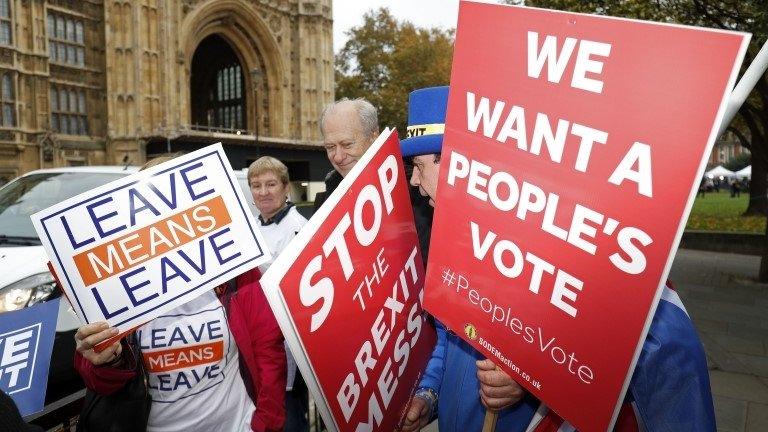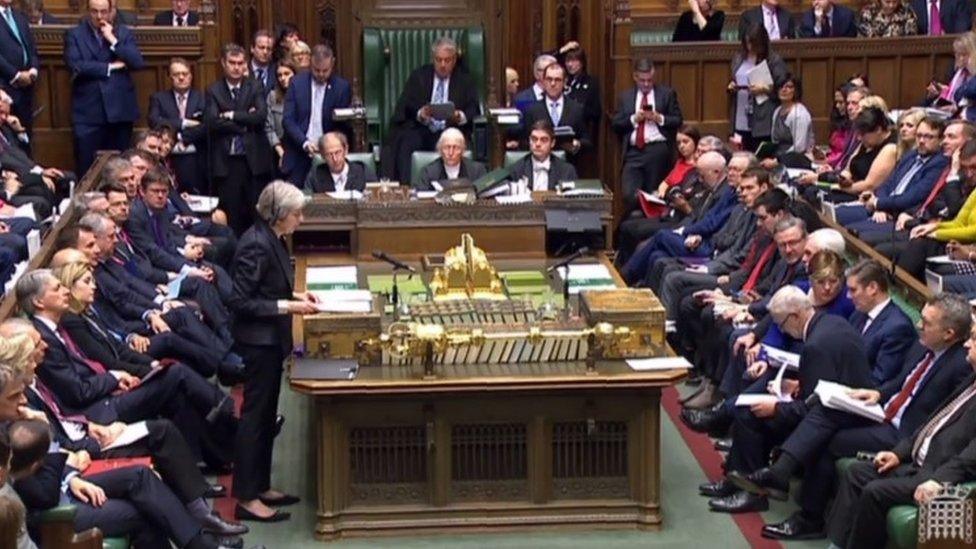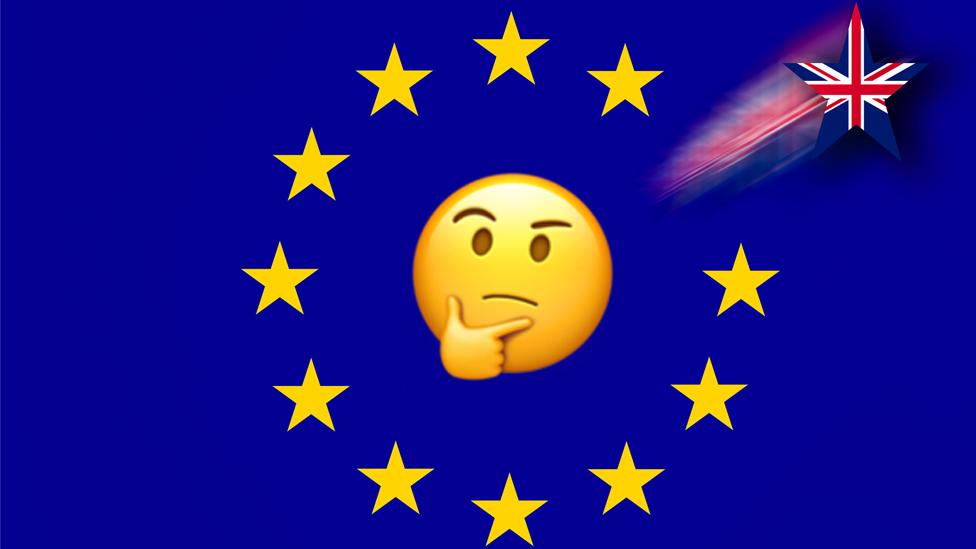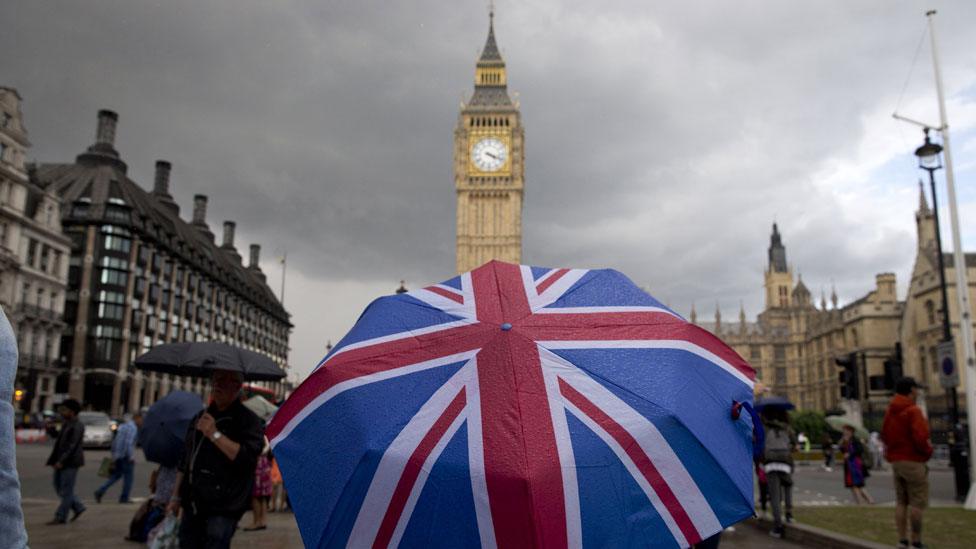Theresa May: Brexit won't be easier if I'm ousted
- Published
Dominic Raab: "I've got huge respect for her... it's not flim flam"
Theresa May has told her critics that getting rid of her as PM would not make delivering Brexit any easier.
Mrs May defended last week's draft agreement for leaving the EU and said there was a "critical" week ahead.
She suggested agreeing more details of UK's future relationship with the EU, ahead of an expected summit next week, could satisfy the concerns of some of the Tory MPs opposed to her plans.
Ex-Brexit Secretary Dominic Raab said the UK was being "bullied" by the EU.
Labour leader Jeremy Corbyn said his party could get a better deal in time for Brexit, which is due to happen on 29 March.
There has been widespread criticism of the 585-page withdrawal agreement - published alongside a shorter document setting out what the UK and EU's future relationship could look like - which is set be signed off at a summit next week.
There is also doubt over whether it can win the approval of the House of Commons.
Some cabinet ministers have resigned, including Mr Raab, and others are believed to be trying to change its wording.
In other developments:
The European Commission has proposed 31 December 2022 as the ultimate end date for any extension to the post-Brexit transition period
The key Brexiteer group of Tory MPs has published, external its rebuttal of the draft plan - saying it will make the UK a "rule-taker"
A poll of 505 Tory councillors found more were against the deal than for it - but a majority wanted MPs to back Theresa May
Scottish First Minister Nicola Sturgeon confirmed her MPs would vote against the deal
Mrs May told Sky News's Ridge on Sunday it had been a "tough week" but that she would not be distracted. She added the next seven days "are going to be critical" for the UK's future.
Asked whether Sir Graham Brady - chairman of the backbench 1922 committee - had received the 48 letters needed to trigger a confidence vote in her leadership, she replied: "As far as I know, no - it has not."
And in a warning to those pushing for a change of leader, she said: "It is not going to make the negotiations any easier and it won't change the parliamentary arithmetic."
BBC correspondents explain 585 pages faster than you could print them... on a BBC photocopier
Mrs May said negotiations were still taking place to put more detail into the future deal proposals, saying it was this part that "delivers on the Brexit vote".
She also said she would be meeting European Commission chief Jean-Claude Juncker in Brussels ahead of the summit.

What's happening this week?
BBC Europe editor Katya Adler
The European Commission says Mrs May will only meet Mr Juncker when concrete progress has been made on the content of the political declaration document on the future relationship.
Those negotiations have been going on this weekend and had been expected to conclude on Tuesday - let's see.
EU sources are clearly spelling out that the PM's visit would be to finalise this political declaration - and not to re-open the withdrawal deal approved last week by the cabinet.
Despite the political turmoil in the UK, the EU intends the Brexit summit between EU leaders and the PM to go ahead next Sunday unless she is kicked out of her job, or she suddenly politically denounces the divorce deal she has been trying to sell.
Don't forget - the withdrawal agreement will be legally binding. The political declaration on the future will not. It can be altered after Brexit, because it is only then that the detailed EU-UK negotiations on a future trade deal begin in earnest.

Meanwhile in Brussels...
EU chief negotiator Michel Barnier has been meeting diplomats from the 27 remaining EU member states.
The EU has now proposed 31 December 2022 as the ultimate end date for a possible extension to the transition period.
This period, during which the UK will have left but arrangements will largely continue as they are, is currently forecast to finish by the end of 2020.
Confused by Brexit jargon? Reality Check unpacks the basics.
The draft withdrawal agreement includes the option of extending it if more time is needed to reach a trade deal - but rather than specifying an end date, says a decision may be taken "extending the transition period up to [31 December 20XX]."
Also in the meeting there was a divide between states that want an ambitious trading relationship with the UK and those who want Britain's access to the single market to be more constrained, BBC Brussels correspondent Adam Fleming said.
The UK wants to maintain the status quo on internal security, which is also "a problem," ambassadors were told.
And Spain raised serious concerns about Gibraltar, which officials fear could grow in the coming days, he added.
A diplomat said the message from the EU's Brexit negotiators to the member states was: "Keep a lid on your concerns for now and we'll deal with them in the negotiations on the future relationship."
How close is May to a no confidence vote?
Sir Graham told BBC Radio 5 Live's Pienaar's Politics he would not reveal how many letters he had received - saying he had not even told his wife, who is his parliamentary assistant.
"I get asked in the supermarket, in the street," he said.
Sir Graham said he found the suggestion he had received 48 letters but not acted on it to be "slightly offensive".
"It's critical that people trust my integrity in this," he said.
Sir Graham also told the BBC's Sunday Politics North West it was "very likely" Mrs May would win a vote of no-confidence if there was one.
What would a vote mean for the Brexit summit?
It is difficult to see how the 25 November EU summit could go ahead if Mrs May were to lose a confidence vote next week.
It is up to Sir Graham to decide when such a vote would be held, but he has said the process will move quickly.
The last time a Tory leader was ousted by their own MPs, in 2003, Iain Duncan Smith faced a confidence vote the next day.
If Mrs May were to lose that confidence vote it would spark a leadership election but she would not be allowed to run. She would remain prime minister until the contest was over unless she opted to resign and hand over to a caretaker prime minister.
In either circumstance, her version of Brexit would be in doubt.
European Council President Donald Tusk has said the summit will go ahead unless something "extraordinary" happens - he did not elaborate on what that might be.
Why did Brexit Secretary Dominic Raab resign?
Mr Raab, who negotiated with the EU's Michel Barnier, explained his decision to quit on the BBC's Andrew Marr show.
With "two or three points" being changed he could support the government's proposals, he said.
He said he did not know who had inserted a clause on customs relations into the future partnership document but said it was a "clear breach" of the Conservative manifesto.
"The difficulty for me is that I was being asked to go over to Brussels and sign on the bottom line... on a deal which I said in good conscience I did not feel was right for the country," he said.
"I do think we are being bullied, I do think we are being subjected to what is pretty close to blackmail frankly.
"I do think there is a point at which, we probably should have done it before, where we just say 'I'm sorry this is the United Kingdom of Great Britain and Northern Ireland, we cannot accept those dictated terms'."
Why are people unhappy with the deal?
The draft document, external sets out the terms of the UK's departure, including details such as how much money will be paid to the EU, details of the transition period and citizens' rights.
Both the UK and the EU want to avoid a hard Northern Ireland border so they agreed to include in the deal a "backstop" - or back-up plan - in case they cannot reach a long-term trade agreement which does this.
This would mean Northern Ireland would stay more closely aligned to some EU rules, which critics say is unacceptable.
And the UK would not be able to leave the backstop without the EU's consent.
Writing in the Sunday Telegraph,, external the Brexiteer MP Zac Goldsmith said under the PM's plan "in effect, Britain would remain in the EU, but without having any say".
He added: "Had that been the choice, I personally would have voted to remain."
What would Labour do?
Labour leader Mr Corbyn says his party, which has 257 MPs, will not support the deal.
He told Sky News the "one-way agreement" on Northern Ireland was "not acceptable", and there were no guarantees on workers' rights and environmental protections.
If it was voted down in the Commons, he said the government should go back to the EU and "renegotiate, rapidly".
Mr Corbyn insisted Labour would be able to negotiate a better deal, saying the proposed transition period - which will only happen if there is a withdrawal agreement - offered "some opportunities" for this.
He also said another referendum - as demanded by some of his MPs - was "an option for the future but not an option for today".
He said he voted Remain in the 2016 referendum but if there were to be another "I don't know how I would vote - what the options would be at that time".
He also revealed that he had not yet read all of the 585 page draft EU withdrawal agreement.

- Published25 November 2018

- Published16 November 2018
- Published26 November 2018

- Published16 November 2018

- Published16 November 2018
